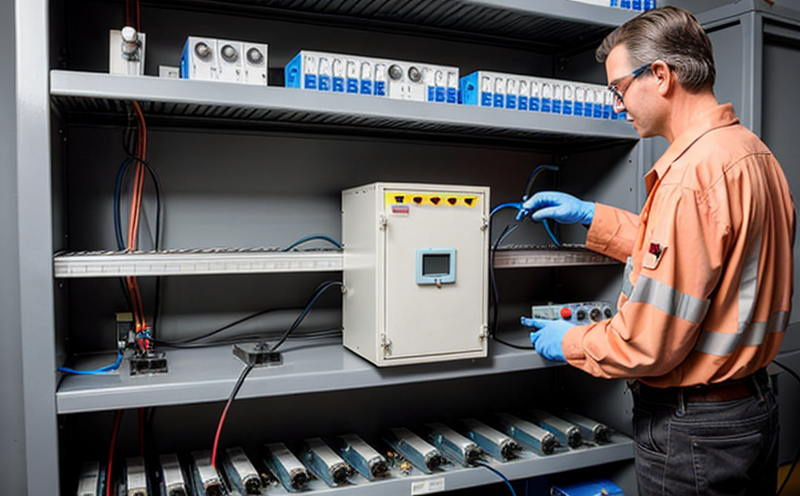Capacitor bank inspection
In energy systems and environmental surveillance, capacitor banks play a critical role in providing reactive power support to the grid. These banks are essential for maintaining voltage stability and ensuring efficient electricity distribution. Over time, capacitors can degrade due to operational stresses such as thermal cycling, mechanical vibrations, and electrical overloads. Regular inspections of these components are therefore crucial to ensure their optimal performance and prevent potential failures that could disrupt service.
The inspection process involves detailed examinations using non-destructive testing (NDT) techniques to assess the condition of capacitors without compromising their integrity. This includes visual inspections for physical damage, measurement of capacitance values, dielectric loss factor (DLF), and temperature rise tests. By adhering to international standards such as IEEE C57.12.90-2013, these checks help in identifying issues early on so that necessary repairs or replacements can be planned.
At Eurolab, our team of experts uses cutting-edge equipment like capacitance testers and thermal imagers to conduct thorough inspections tailored specifically for capacitor banks. Our services not only meet but exceed industry expectations by providing precise reports based on rigorous testing protocols. This ensures that customers receive accurate information about the health status of their capacitors which is vital for maintaining reliable power supply systems.
Our team understands that each installation has unique requirements, so we customize our approach to fit your specific needs while ensuring compliance with all relevant regulations and best practices. With years of experience in this field, Eurolab offers comprehensive solutions designed to protect valuable assets and minimize downtime caused by unforeseen failures.
Applied Standards
To ensure consistent quality and reliability across different applications involving capacitor banks, several international standards provide guidelines for testing methods and acceptance criteria. For instance, IEEE C57.12.90 specifies the procedures for determining the capacitance, dissipation factor (or dielectric loss), and other parameters of power capacitors during routine tests.
ASTM D3624-18 outlines recommended practices for evaluating the performance characteristics of capacitor banks used in utility distribution systems. These standards are instrumental in ensuring that inspections conducted by Eurolab meet industry benchmarks, providing peace of mind to our clients regarding the accuracy and validity of results obtained from these tests.
Eurolab Advantages
At Eurolab, we pride ourselves on delivering top-notch capacitor bank inspection services backed by decades of experience in this field. Our team comprises highly skilled professionals equipped with state-of-the-art diagnostic tools capable of detecting even the slightest anomalies within these critical components.
- Comprehensive Testing: We employ a variety of advanced testing methods including capacitance measurement, dielectric loss factor determination, and thermal imaging to provide a holistic view of each capacitor's condition.
- International Compliance: Every inspection adheres strictly to recognized international standards like IEEE C57.12.90 ensuring that our findings are universally accepted and actionable.
- Detailed Reporting: After completing the assessment, we generate detailed reports outlining our observations along with recommendations for maintenance actions or replacements if needed.
Choosing Eurolab means more than just receiving technical support; it signifies partnering with a reliable partner committed to your success. Our commitment translates into faster turnaround times, lower costs, and enhanced confidence in the reliability of your power distribution infrastructure.
Use Cases and Application Examples
- Data Centers: Ensuring uninterrupted supply to data centers requires robust capacitor banks capable of handling high load conditions. Regular inspections ensure these systems remain reliable even under extreme stress.
- Hospitals: Hospitals depend heavily on stable electricity supplies for critical medical equipment. Proper maintenance and inspection of capacitor banks help prevent interruptions that could jeopardize patient care.
- Commercial Buildings: Large commercial buildings use significant amounts of electrical power. Efficient operation of capacitor banks contributes significantly to overall energy efficiency, reducing operational costs over time.
- Railways: Rail transport relies on stable voltage levels for smooth operations. Periodic inspections ensure that capacitor banks contribute positively towards maintaining consistent performance throughout rail networks.
In summary, proper maintenance of capacitor banks is essential across various sectors where reliable power supply is paramount. By leveraging Eurolab's expertise and state-of-the-art facilities, organizations can safeguard their investments and enhance operational efficiency.





